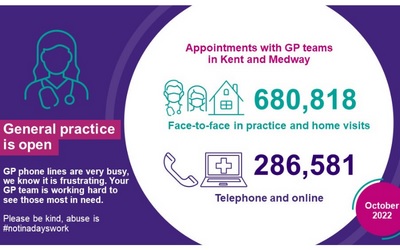NHS Kent and Medway is working with general practice, the local medical committee and wider NHS partners to address pressures in General Practice. Like elsewhere in the country, General Practice in Kent and Medway is under intense pressure at the moment.
General practice is consistently delivering more appointments than ever before, but demand is increasing.
Why are GP practices so busy?
There are lots of reasons why practices across the country are under pressure. These include:
- backlog of work built up during the pandemic, which has meant many patients are presenting with more complex issues
- increased waiting lists for surgery since the pandemic meaning some people are living with untreated conditions and need ongoing and increasingly complex support from the General Practice team.
- GP workload has grown in volume, complexity and intensity
- recruiting into General practice teams
- infrastructure and premises (such as buildings and telephone systems)
Why is it more difficult to see a member of the general practice team face-to-face?
Face-to-face appointments have been back at pre-pandemic levels consistently since around June 2021 with some short-term exceptions (for example while practices prioritised the booster campaign last Christmas, delivering 300,000 vaccinations in a month).
Between April 2019 and February 2020 (10 months prior to the pandemic), general practice in Kent and Medway carried out 7.5million appointments.
Between April 2021 and February 2022 (10 months ‘post’-pandemic), Kent and Medway practices delivered over 9million total appointments.
General practice carried out over 1.5million more appointments in the same time period.
The number of face-to-face appointments has remained around the same at just over 5million a year. This means that while a lower percentage of total appointments are taking place face-to-face, the same number of face to face appointments are being carried out. Were these to increase significantly the total number of appointments offered would need to be reduced.

How are practices working?
Most practices had started to introduce telephone triage before the pandemic and, although circumstances sped up adoption in some areas, this is now how most practices will work in the future.
Appointment requests and other queries are triaged by a trained call handler to identify the right member of staff to see the patient through the right type of appointment.
Many practices use econsult, an online consultation system for those people who have digital access to be able to request an appointment without needing to call the practice.
The multi-professional team
The workforce in general practice has been changing for some time with a range of trained clinicians now working in practices, making sure patients can see the right person, first time. These include paramedics, nurse practitioners and social prescribers. More information on these roles can be found here.
When you call your practice you will be asked questions to determine who is best for you to see, which may not always be a GP.
We use cookies to help provide you with the best possible online experience.
By using this site, you agree that we may store and access cookies on your device. Cookie policy.
Cookie settings.
Functional Cookies
Functional Cookies are enabled by default at all times so that we can save your preferences for cookie settings and ensure site works and delivers best experience.
3rd Party Cookies
This website uses Google Analytics to collect anonymous information such as the number of visitors to the site, and the most popular pages.
Keeping this cookie enabled helps us to improve our website.
